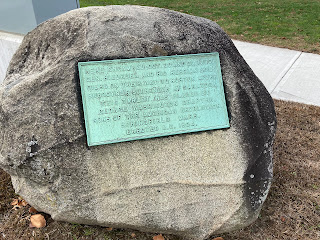Kinderhook Part II - "October 23d Cost Us Some Good Men"

On October 22, 1777, "... after plodding fifteen miles..." from Greenbush , the German column of the Convention Army reached the town of Kinderhook, New York. [ 1] The name, meaning "children's corner" in Dutch, may have been given to the area in the early 1600's by Dutch explorers who saw Native children on a river bluff watch them sail past - or maybe by Dutch traders, as a Swedish settler with numerous children lived there. What makes up the town today is set on the Kinderhook Creek, seven miles northwest of the Hudson River, and twenty miles southeast of Albany, though the town's boundaries initially extended all the way to the river. Kinderhook's first European residents were Dutch and Swedish settlers who arrived around 1650. [2] The Dutch exploration and settlement of the Hudson River valley was more apparent to the Convention Army, in towns as far north as Stillwater, New York , and as east as Pownal, Vermont , than it is to many of us ...


